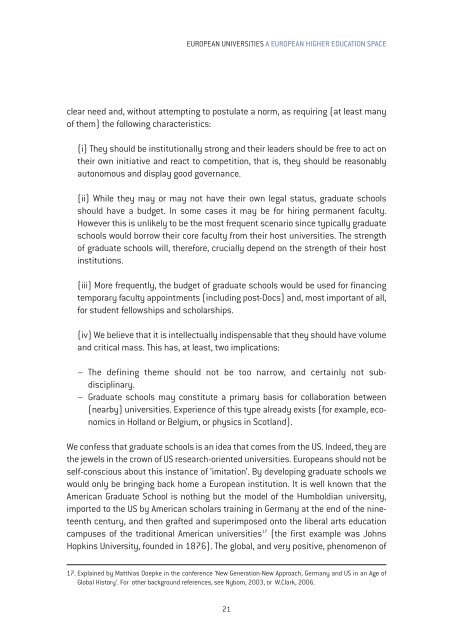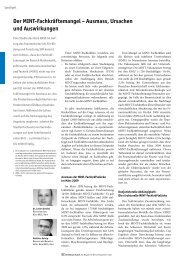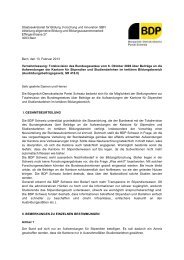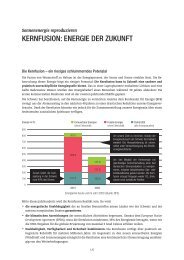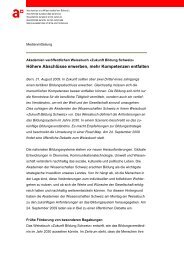Higher aspirations: an agenda for reforming European universities
Higher aspirations: an agenda for reforming European universities
Higher aspirations: an agenda for reforming European universities
You also want an ePaper? Increase the reach of your titles
YUMPU automatically turns print PDFs into web optimized ePapers that Google loves.
EUROPEAN UNIVERSITIES A EUROPEAN HIGHER EDUCATION SPACE<br />
clear need <strong>an</strong>d, without attempting to postulate a norm, as requiring (at least m<strong>an</strong>y<br />
of them) the following characteristics:<br />
(i) They should be institutionally strong <strong>an</strong>d their leaders should be free to act on<br />
their own initiative <strong>an</strong>d react to competition, that is, they should be reasonably<br />
autonomous <strong>an</strong>d display good govern<strong>an</strong>ce.<br />
(ii) While they may or may not have their own legal status, graduate schools<br />
should have a budget. In some cases it may be <strong>for</strong> hiring perm<strong>an</strong>ent faculty.<br />
However this is unlikely to be the most frequent scenario since typically graduate<br />
schools would borrow their core faculty from their host <strong>universities</strong>. The strength<br />
of graduate schools will, there<strong>for</strong>e, crucially depend on the strength of their host<br />
institutions.<br />
(iii) More frequently, the budget of graduate schools would be used <strong>for</strong> fin<strong>an</strong>cing<br />
temporary faculty appointments (including post-Docs) <strong>an</strong>d, most import<strong>an</strong>t of all,<br />
<strong>for</strong> student fellowships <strong>an</strong>d scholarships.<br />
(iv) We believe that it is intellectually indispensable that they should have volume<br />
<strong>an</strong>d critical mass. This has, at least, two implications:<br />
– The defining theme should not be too narrow, <strong>an</strong>d certainly not subdisciplinary.<br />
– Graduate schools may constitute a primary basis <strong>for</strong> collaboration between<br />
(nearby) <strong>universities</strong>. Experience of this type already exists (<strong>for</strong> example, economics<br />
in Holl<strong>an</strong>d or Belgium, or physics in Scotl<strong>an</strong>d).<br />
We confess that graduate schools is <strong>an</strong> idea that comes from the US. Indeed, they are<br />
the jewels in the crown of US research-oriented <strong>universities</strong>. Europe<strong>an</strong>s should not be<br />
self-conscious about this inst<strong>an</strong>ce of ‘imitation’. By developing graduate schools we<br />
would only be bringing back home a Europe<strong>an</strong> institution. It is well known that the<br />
Americ<strong>an</strong> Graduate School is nothing but the model of the Humboldi<strong>an</strong> university,<br />
imported to the US by Americ<strong>an</strong> scholars training in Germ<strong>an</strong>y at the end of the nineteenth<br />
century, <strong>an</strong>d then grafted <strong>an</strong>d superimposed onto the liberal arts education<br />
campuses of the traditional Americ<strong>an</strong> <strong>universities</strong> 17 (the first example was Johns<br />
Hopkins University, founded in 1876). The global, <strong>an</strong>d very positive, phenomenon of<br />
17. Explained by Matthias Doepke in the conference ‘New Generation-New Approach, Germ<strong>an</strong>y <strong>an</strong>d US in <strong>an</strong> Age of<br />
Global History’. For other background references, see Nybom, 2003, or W.Clark, 2006.<br />
21


